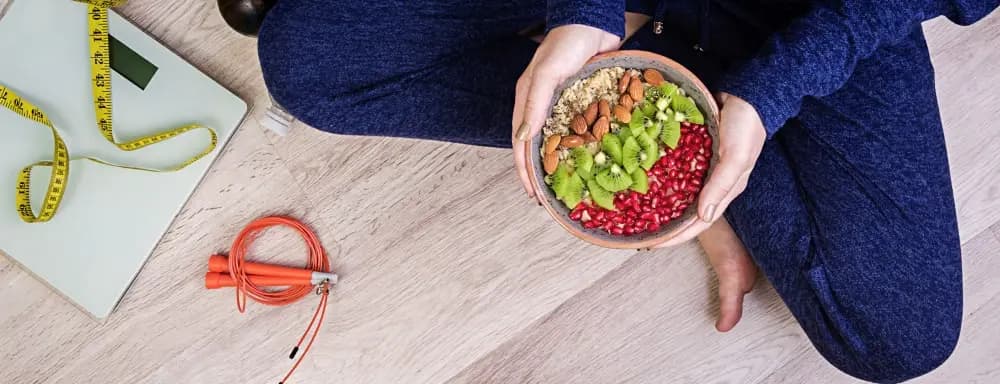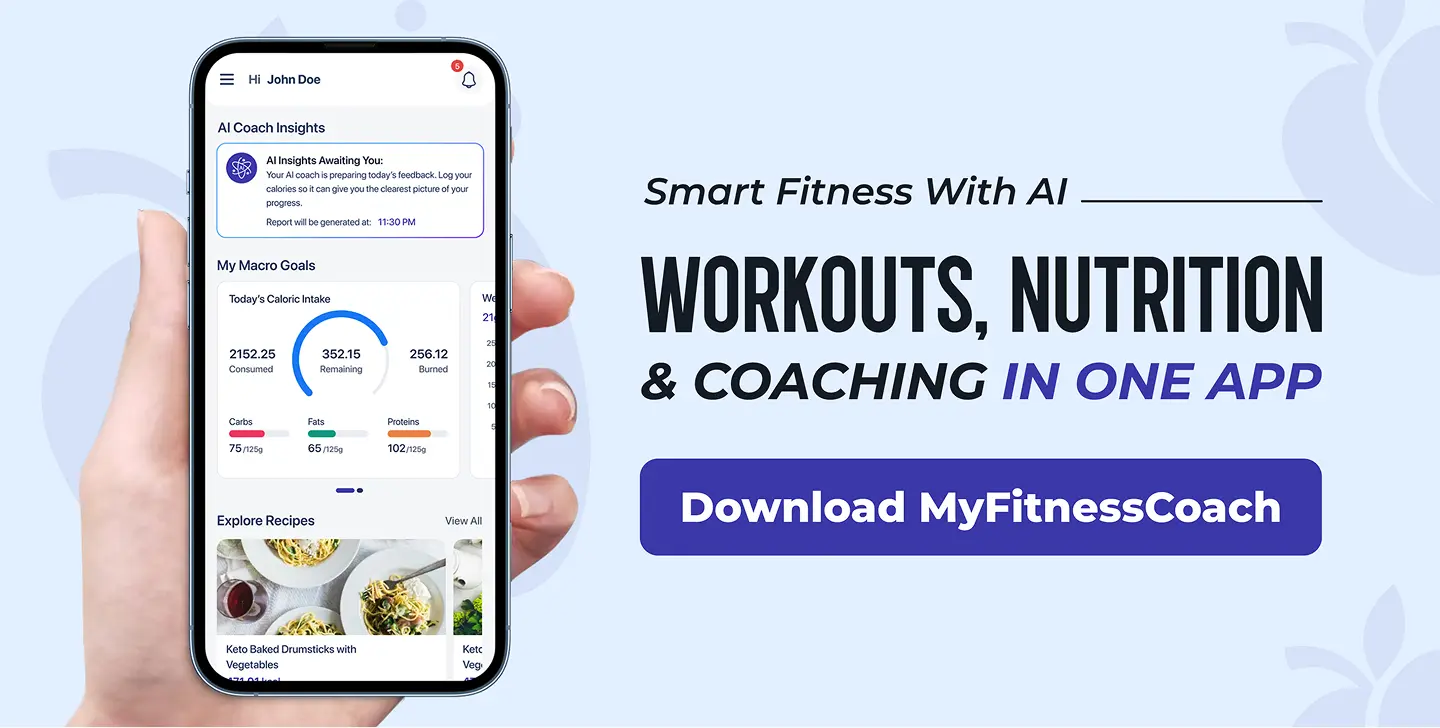How to Use a Diet Break for Fat Loss & What is it

MyFitnessCoach
May 26, 2025
Trying to lose weight can be tough. You count your calories, eat less, exercise more and sometimes, your progress still slows down. That’s where a diet break can help. But what is a diet break, really? And how can it help with fat loss and reaching your goals?
In this article, we’ll explain what a diet break is, how it works, when to take one, and how it can help improve your weight loss journey. Whether you’re just starting or have been dieting for months, this simple trick might make a big difference.
Let’s dive in.
Why Would You Need a Diet Break?
Here are a few common reasons to take a break from your diet:
- You’ve been dieting for a long time and feel tired or unmotivated.
- You’ve hit a plateau and aren’t losing weight anymore.
- You’re always hungry, grumpy, or low on energy.
- You want to give your body a break to help prevent metabolic adaptation.
Let’s be honest, dieting isn’t easy. Staying in a calorie deficit for long periods of time can make your body think it’s starving. This can lead to low energy, a slower resting metabolic rate, and even mood changes. A diet break helps your body reset.
Benefits of Taking a Diet Break
Taking a break from your diet might sound scary, but it actually has many benefits. Here are some of the top ones:
1. Boosts Metabolism
Eating more for a few days can help bring your metabolism back to normal. This is especially helpful after long fat loss phases when your body has slowed down to save energy.
2. Helps with Hunger and Cravings
Constant dieting can make you super hungry. A diet break lets your hunger hormones calm down, so you don’t feel like eating everything in sight.
3. Supports Mental Health
Let’s face it tracking every bite can get exhausting. A short break helps reduce stress and lets you feel “normal” for a little while.
4. Improves Workout Performance
When you’re eating more, you have more energy. This helps you train harder during resistance training or cardio workouts.
5. Protects Muscle Mass
When done right, a diet break helps you hold on to muscle mass, which is super important for a healthy body and better body composition.
How to Implement a Diet Break
Taking a diet break is simple. Here's a step-by-step guide:
Step 1: Know Your Maintenance Calories
Your maintenance calories are how much food your body needs to stay the same weight. You can find this using an online calculator, your MyFitnessCoach app, or by tracking your weight and food intake for a week.
Step 2: Raise Calories Slowly
Instead of jumping from 1,500 to 2,500 calories overnight, raise your calories by about 300–500 per day. Focus on whole foods like lean meats, veggies, whole grains, and healthy fats.
Step 3: Keep Working Out
Even though you’re eating more, don’t stop moving. Keep lifting weights, walking, or doing yoga. This helps your body use the extra food to build muscle instead of storing fat.
Step 4: Set a Time Limit
Most people take diet breaks for 1 to 2 weeks. Some might only need a few days. If you’ve been dieting for 12 weeks or more, taking a 2-week break can be helpful.
Step 5: Go Back to Your Diet (If Needed)
Once your break is done, you can go back to your fat loss plan if you're still trying to lose weight. You might feel more refreshed and ready to keep going.
Intermittent Diet Break vs. Long Breaks
There are different ways to take a diet break:
- Intermittent Diet Break – You take breaks every few weeks. For example, 2 weeks dieting, 1 week break, and repeat.
- Planned Long Break – You diet for a longer time (like 16 weeks), then take a longer break (like 2-4 weeks).
Your choice depends on how your body feels and how much fat you want to lose. Some people do better with regular breaks. Others prefer to push longer before resting.
Who Should Take a Diet Break?
A diet break is great for:
- People who have been dieting for many weeks without a break
- Those who feel low in energy or stuck on a plateau
- Anyone who wants to make weight loss easier and safer in the long term
But remember, if you’re just starting out or have only been dieting for a short time, you may not need a break yet.
Does a Diet Break Cause Weight Gain?
Nope not if you do it the right way.
When you increase your food to your maintenance level, your weight might go up a little due to extra water or food in your belly but that’s not fat gain. If you keep your calories in check and stay active, you’ll keep your progress.
In fact, diet breaks can help you lose more fat in the end by giving your body the rest it needs to keep going.
How MyFitnessCoach Helps You With Diet Breaks
MyFitnessCoach makes diet super easy.
- Use the Food Logger to track your maintenance calories.
- Get a Customized Diet Plan that adjusts your calories during a break.
- Try Yoga, Pilates, or Meditation during your break to relax.
- Keep up with your Workout Logger to stay on track.
- Use the Build Your Own Workout feature to stay active your way.
- Connect your wearable to track your fitness and body composition easily.
With MyFitnessCoach, you can manage your fat loss journey like a pro no confusion, just simple steps.
When Should You Avoid a Diet Break?
While diet breaks are helpful, they’re not for everyone. Avoid taking a diet break if:
- You’ve only been dieting for a short period of time
- You’re not tracking your calories at all
- You’re in a medical weight loss plan (talk to your doctor first)
Also, don’t use diet breaks as an excuse to binge. A fat-loss diet needs balance, and diet breaks are meant to help—not undo your hard work.
Final Thoughts: Should You Try a Diet Break?
Now that you know what is a diet break, you can see it’s not about giving up it’s about playing smart. Dieting too hard for too long doesn’t help anyone. Sometimes, slowing down is the best way to keep going strong.

If your fat loss has stalled or you’re feeling worn out, a diet break may be exactly what your body needs.
Ready to take your fitness journey seriously with smart breaks, personalized plans, and the tools you need? Download MyFitnessCoach today and start building a healthier body with fewer struggles and more success!
Similar Articles
Stay informed with these similar articles.
%20(1)%20(1)%20(1)%20(3).webp&w=3840&q=75)
MyFitnessCoach
May 8, 2023
Delicious Fitness Meal Prep Recipes For A Healthy Lifestyle
Fitness is all about having a balance between workouts and an appropriate diet. Getting a proper nutritious meal is as important as doing a workout. Exercise and diet both go hand in hand. Hence, adding fitness meal prep recipes to your fitness routine is important to reach your goal. This article has articulated some delicious and healthy meal prep recipes for you. These recipes surely make your meal tasty as well as full of nutrients. Let’s wait no further and check them out.
.webp&w=3840&q=75)

MyFitnessCoach
March 5, 2025
Net Calories Meaning: A Simple Guide to Understanding Your Fitness Goals
When it comes to fitness and weight management, the term "net calories" is often thrown around. But what does it really mean? If you're trying to lose weight, gain muscle, or simply maintain your current physique, understanding net calories is crucial. In this article, we’ll break down the concept of net calories in simple words, explain how it impacts your fitness journey, and introduce you to a powerful tool—MyFitnessCoach—that can help you track and achieve your goals.
